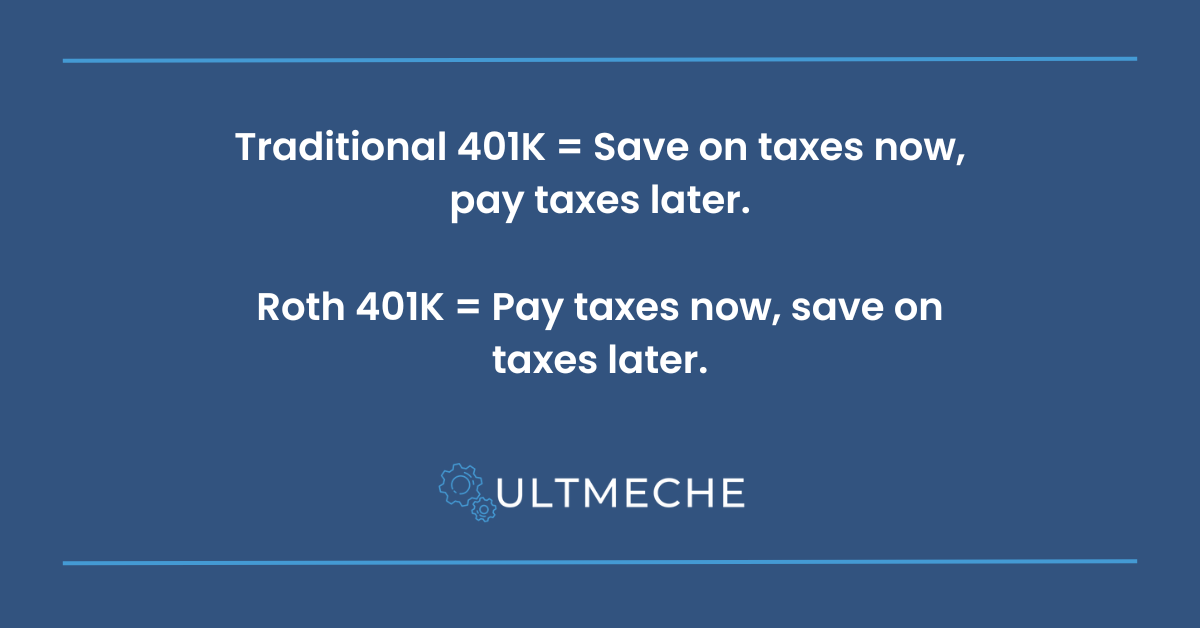When you land a high-paying role, it’s common to wonder how you can maximize income and savings. This leads many people to question “should I max out my 401K?”
The short answer is, perhaps, but maxing out your 401K can be a significant financial decision with many implications. These implications may not only impact you in retirement, but more immediately if you do not fully understand your options.
Let’s explore the pros and cons to help you make an informed choice.

Understanding the 401K
A 401K is a retirement savings plan sponsored by employers.
In essence, it allows employees to save and invest a portion of their paycheck before taxes are taken out.
Here’s a brief overview of why so many use a 401K to save for retirement:
- Tax Benefits – Contributions are tax-deferred, reducing your taxable income.
- Employer Match – Many employers match a portion of your contributions, essentially giving you free money.
- Investment Growth – Funds grow tax-free until withdrawal.
There are two main types of 401(k) to consider when looking at benefits. Traditional and Roth.
Here’s a simple way to understand them:
Traditional 401K:
- Less Tax Now: When you put money into a traditional 401K, it comes out of your paycheck before taxes are taken out. This means you pay less in taxes now.
- Taxes Later: When you take money out in retirement, you have to pay taxes on it.
Roth 401K:
- Tax Now: When you put money into a Roth 401K, it comes out of your paycheck after taxes are taken out. This means you pay the taxes now.
- No Taxes Later: When you take money out in retirement, you don’t have to pay taxes on it, as long as you follow the rules.
Traditional 401K = Save on taxes now, pay taxes later.
Roth 401K = Pay taxes now, save on taxes later.

Should I Max Out My 401K? – The Pros and Cons
Let’s take a look at the advantages and drawbacks of a traditional 401K in more detail.
The Benefits Should I Max Out My 401K?
What are the benefits of maxing out your 401K?
Maximizing Tax Advantages
Contributing the maximum limit to your 401K reduces your taxable income significantly. For 2024, the limit is $23,000 for those under 50 ($69,000 for the combined employee and employer contributions), and $30,500 for those 50 and older due to catch-up contributions.
For those in high-paying roles or looking to reduce the amount of taxable income they earn, this contribution amount (and the potential for immediate tax savings) could be significant.
Employer Matching
If your employer offers a matching contribution, maxing out your 401K means you can take full advantage of this benefit. This match can greatly enhance your retirement savings.
Employer matching essentially allows you to access free money towards your retirement. It’s an extremely valuable benefit. With compound interest in mind, it might be one of the most valuable benefits an employee can have in terms of financial return.
Compound Growth
The more you contribute early in your career, the more you benefit from compound interest. Over time, this can lead to a substantial growth of your retirement fund.
The “snowballing” effect of compound interest means that significant early investment into your 401K can be hugely advantageous over the rest of your working life.
Financial Discipline
Regular, significant contributions to your 401K can instill a strong saving habit, and help you to have financial discipline that can benefit you in other areas of your life.
The Drawbacks: Should I Max Out My 401K?
This all sounds great, but what are the cons of maxing out your 401K?
Liquidity Issues
Money invested into a 401K is not easily accessible until retirement age, and this can mean you have less access to funds when you need them during your working life.
Withdrawing early results in penalties and taxes, which could be problematic if you need funds in an emergency.
The penalty for early withdrawal is typically 10% and this can negate many of the advantages associated with compound interest.
Loss Of Opportunity
While saving for retirement is crucial, maxing out your 401K might limit your ability to invest in other opportunities, such as buying property or investing in a business.
When planning significant investments into funds you won’t be able to access for a long time, it’s important to also prioritize short-term savings for more time-sensitive opportunities.
Tax Rate Considerations
If you expect to be in a higher tax bracket during retirement, the tax-deferred nature of a 401K might not be as advantageous.
Roth IRAs or other investment vehicles could be more beneficial in such cases.
Balancing Your Contributions
Maxing out your 401K isn’t the only way to prepare for retirement and create a healthy financial profile. Here are some other strategies you can use for more balance in your investments.
Emergency Fund
Always ensure you have an adequate emergency fund before maxing out your 401K. Financial advisors typically recommend three to six months’ worth of living expenses.
Because 401K funds are hard to access, this is vital before you make significant contributions.
Diversified Investments
Consider other investment options, such as Roth IRAs, brokerage accounts, or real estate.
Diversifying your investments can help manage risk and optimize returns, particularly in what is currently a fairly unstable economy.
Investment accounts allow you to buy stocks, bonds, mutual funds, ETFs, and other securities to diversify your portfolio and manage risk.
Investments offer opportunities for a greater return than savings or your 401K, but they have a much higher risk profile.
High-Yield Savings Accounts
A high-yield savings account is a type of savings account that offers a higher interest rate than a traditional savings account. In some cases, these can be a more accessible way to accrue interest on savings. These are also lower risk than many investments.
Debt Management
Pay off high-interest debt before maxing out your 401K. The interest you accrue on debt can often outweigh the benefits of tax-deferred savings.
Financial Goals
Evaluate and set overall financial goals. If you have short-term goals, like buying a house or starting a business, allocate funds accordingly instead of focusing solely on your 401K.
Conclusion – Should I Max Out My 401K?
It’s commonly recommended that you add around 15% of your income to retirement savings in some form, if this means maxing out your 401K then it could be worthwhile.
There are many advantages of a 401K, particularly in terms of tax savings, employer contributions, and compound growth.
However, it’s essential to consider your liquidity needs, other more short-term investment opportunities, and overall financial goals.
A balanced approach, tailored to your specific circumstances, can provide a more secure and flexible financial short-term and long-term future.
Always consult with a financial advisor to tailor your strategy to your personal situation.
Want a high-paying role with great 401K benefits? These templates will help you land an interview.
About the author

Mollie Buttery
Writer | SEO | Articles & Blog Posts | Social Media
Mollie supports ULTMECHE through website growth, social media, SEO, and also other digital marketing tricks. Mollie has 10+ years experience of in house and freelance marketing experience in industries such as Finance, Law, SAAS, Automotive, Building Services, Commerce, and more. Some of her favorite writing topics consist of sports and finance. Mollie has been key to the growth of ULTMECHE’s SEO and digital marketing efforts.
